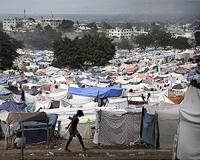| . |  |
. |
Geneva (AFP) Jan 7, 2011 UN relief agencies on Friday defended their role in the much criticised aid effort after Haiti's devastating earthquake nearly a year ago, saying they had faced "apocalyptic" scenes. "We had to work on a kind of apocalyptic ground, a disaster. That's why I think we did our job well with regard to the situation," said Elisabeth Byrs, a spokeswoman for the UN Office for the Coordination of Humanitarian Affairs. Several non governmental organisations have criticised international aid over the past year for providing too little help too slowly. The charity Oxfam said this week that the recovery effort in the impoverished Caribbean country was put on hold by "a year of indecision" after 250,000 people were killed and 1.9 million displaced by the January earthquake. It blamed many rich nation donors for following their own aid priorities with little effective coordination. Byrs told journalists that the emergency reponse by humanitarian agencies and NGOs was "good and fast" and insisted that their "life-saving" work should not be underestimated after Haiti's frail public services were virtually destroyed by the tremor in the capital Port-au-Prince. UN agencies said they were "optimistic" despite the prospect of years of labour to prop up Haiti. "If there is one message that UNICEF wants to convey it is that the international response to humanitarian emergency is never perfect and Haiti is no exception," said Marixie Mercado, a spokeswoman for the UN Children's Fund. "But this response has saved lifes and improved many. The crisis if far from over," she told journalists. Mercado noted that malnutrition had not worsened despite the circumstances and that for some of the 725,000 children who received educational support, it marked the first time they went to school. The World Food Programme underlined that four million Haitians were receiving food deliveries six weeks after the tremor. WFP spokeswoman Emilia Casella said there was evidence that "a nutritional crisis... was avoided," in the densely populated earthquake-hit areas. Haiti's misery was capped by a cholera epidemic from October that has left 3,600 dead, in the wake of a deadly hurricane, flooding and mudslides.
earlier related report The grim assessment by Jacques Gabriel, minister for public works, transport and communication, reflects how Haiti is struggling a year after the January 12 earthquake killed more than 220,000 and left some two million people homeless -- about 20 percent of the population. "The task will be very heavy, not just in the city, but in the provinces that were concerned and perhaps nationally," Gabriel told AFP in an interview at his temporary office in the once picturesque, now squalid and half-ruined capital Port-au-Prince. "It's hard to give a time-frame, to say 'two, three, five years.'" Gabriel, a trained engineer, said even rehousing the government of this stricken nation, where the presidential palace lies in ruins, is not imminent. "The state should be able to finance the construction of the administrative complex in the next five years," he said in the interview Wednesday. Haitians living in fetid tent camps are furious that a year after the disaster they are no closer to moving back into real houses. About 1.3 million people had to take shelter in camps, with another 600,000 cramming in with relatives and other hosts. Aid groups estimate that only five percent of the rubble has been cleared, impeding attempts to rebuild. Officials say that only 40 percent of the rubble will have gone by August, a year and a half after the tragedy. Former US president Bill Clinton, who is helping to coordinate relief efforts, called that performance "totally unacceptable," while Oxfam says "indecision" is to blame for the lack of progress. Gabriel admitted that of 390,500 buildings surveyed, less than 1,000 have been repaired by the Haitian authorities. But he said that rebuilding on such a large scale simply can't be done quickly. "We have made an evaluation of the damage caused by the quake and we are working on a reconstruction plan for the city center in Port-au-Prince," he said. "Before rebuilding, you need studies, a global approach, a vision of how to rebuild, what to rebuild, in what conditions and in what ways, taking into account the seismic hazard." Defending himself against widespread accusations of going too slow, he said, "you also need to educate people, train technicians and build in a new way to avoid new catastrophes." A first big rehousing project is due to be launched on Wednesday, the anniversary, with a planned construction of 3,000 apartments in a neighborhood near the flattened presidential palace. "It is a project for public housing with high-rises, but respecting the seismic norms, and housing hundreds of families," he said.
Share This Article With Planet Earth
Related Links Bringing Order To A World Of Disasters A world of storm and tempest When the Earth Quakes
 In squalid Haiti camps assault stalks women: Amnesty
In squalid Haiti camps assault stalks women: AmnestyWashington (AFP) Jan 5, 2011 An Amnesty report laid bare Wednesday horrific accounts of rape in Haiti's squalid refugee camps a year after a devastating quake left many struggling to rebuild their shattered lives. They are women like Guerline, who two months after losing her husband when their home crumbled to the ground in the devastating quake, had to watch as her teenage daughter was raped in a makeshift tarpaulin ca ... read more |
|
| The content herein, unless otherwise known to be public domain, are Copyright 1995-2010 - SpaceDaily. AFP and UPI Wire Stories are copyright Agence France-Presse and United Press International. ESA Portal Reports are copyright European Space Agency. All NASA sourced material is public domain. Additional copyrights may apply in whole or part to other bona fide parties. Advertising does not imply endorsement,agreement or approval of any opinions, statements or information provided by SpaceDaily on any Web page published or hosted by SpaceDaily. Privacy Statement |